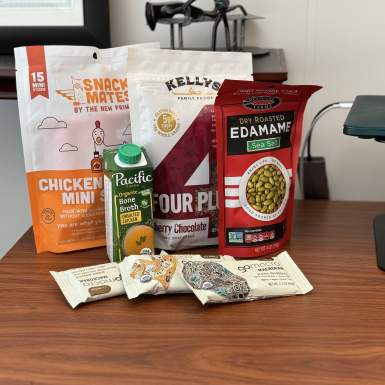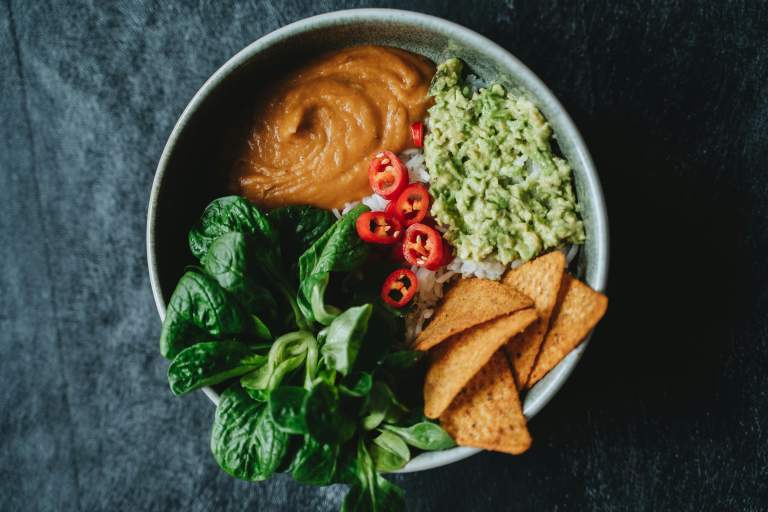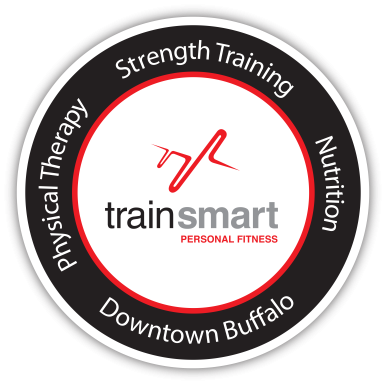The Harvard Medical School says, after the age of 30-years-old, we gradually begin to lose muscle mass at about 3% to 5% per decade. Muscle loss as we age is accompanied by a loss of strength as well. Having less muscle and strength can lead to other risk factors such as falling, independence, and losing the ability to do the active hobbies we enjoy. Luckily for us we can slow down this part of the aging process with better exercise and nutrition. I often get asked questions about protein. Clients and patients want advice on how much protein they should consume. My answer is often more than they are currently eating.
Outpace Age with Intelligence, Strategy, Commitment, and Care.
At TrainSMART, we specialize in creating safe, customized programs designed to build muscle and bone, burn fat, increase strength, enhance balance, boost energy levels, and improve cognitive function. As experts in longevity, our intelligent strategies are crafted with your unique needs in mind. Through unwavering commitment and personalized care, we believe you can feel better and stronger than you did 20 years ago.
Take the first step toward a more vibrant, energetic you.
CALL or TEXT (716) 650 0535 today and let’s outpace age Together!
Am I Getting Enough Protein?
A general protein intake rule for those who regularly strength train on how much is 1g of protein per pound of body weight. I think this is a good mark to strive for. But you’re better off finding out where you are at, then following a gradual increase. If you haven’t tracked your macronutrients, start there and see where you are at. There are easy ways to track food now with smartphone apps like Myfitnesspal. If you find you are well below this mark, start by gradually working your way up and see how you feel. The Recommended Daily Allowance (RDA) for protein .36g of protein per a pound of body weight. This is the minimum your body needs if you are sedentary. To thrive, you need to consume more. Some populations need to eat more. For example, those regularly participating in athletics, mothers who are pregnant or are lactating, and those healing from injury. Protein is the building blocks for our bodies. Therefore, protein is needed to heal and repair tissues in our bodies and create needed hormones and enzymes to function well. Dr. Peter Attia, in his book Outlive, references how even consuming protein without training causes muscle synthesis. Of course, eating protein and strength training together more profoundly increases muscles synthesis.
The best way to fuel your body and get your macronutrients is through whole foods. It’s hard to eat too much protein in a whole food diet. If you have a busy schedule like me, this is impossible to do without a plan. For the past 12 years, my wife and I have been preparing our meals for the week on Sundays. Simply put, each meal has a lean protein and lots of vegetables. But, even with a good meal prep, it can be challenging to get enough protein due to busy schedules and lack of time. As I try to limit and avoid processed foods, I have found that they are the only way I can keep up with an adequate amount protein in my diet. I had a client share the quote of “making a better, bad decision” and this has stuck with me. Having a protein bar
beats the alternative to potato chips from the vending machine.
It is also important to note, protein intake (as well as other nutrients) is best consumed in smaller doses throughout the day. If you have a protein shake with your chicken breast and lentil pasta lunch, you are not going to be able to absorb as much of the nutrients as you would if consumed in more smaller meals.

My High Protein Snacks
I always have a desk packed with high protein stacks that are quick and easy. Here are some options I use as ideas.
- Greek yogurt (Sigi's low sugar, 14g protein, 2g sugar per serving). Tastes good alone, but I like to add Kelly's Four Plus granola on top.
- Dry roasted Edamame (Seapoint Farms: 14g protein per serving). Also good on salad and a good alternative to chips if you want something salty and crunchy.
- Organic bone broth (Pacific: 9g protein per serving) – Great in the winter and when working in a gym that is always cool.
- Meat sticks (New Primal Kids – Chicken & Maple: 7g protein per serving). These were for the kids' lunches until I started grabbing them on the run. Now we stock up.
- Protein powder (Thorne isolate: 21g protein per scoop or Kachava: 12.5g protein per scoop). When home, I blend it with ice, banana, almond or soy milk in a Nutribullet. When at work, I will just simply mix it with water in a blender bottle. I suggest adding it to an oatmeal breakfast too.
- Hemp seeds – We have them in the house and I will give my salad a protein boost if needed.
- Collagen powder - It's easy to mix into coffee.
- GoMacro bars
- Promix breakfast bars
It is important to maintain as much muscle and strength as we age and increasing protein in our diet is a proven strategy. If you have no idea how much protein you are consuming, start by tracking it for 7-10 days to get an idea. If you are under 1g of protein per 1 pound of body weight, active, and have healthy liver function, put your plan together now to increase protein.
Can you have too much protein? Yes. I have learned this the hard way. I will share that in my next article.

